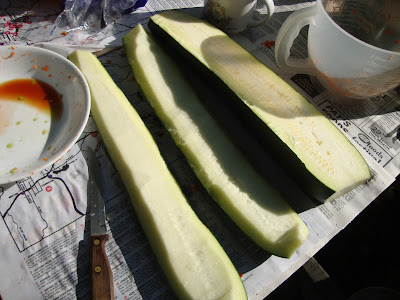My mother used to do a lot of gardening and a lot of canning. One of the things she made was a relish that over the years became known as The Awesome Relish. Everyone loved it. The Younger Daughter once had a boyfriend who liked it so much that when they broke up, Tammi told me she had a feeling that the ex was going to miss the relish more than he missed her.
As long as my mother was making it and even after she passed along a copy of the recipe, I assumed she used cucumbers. Nope. Turns out she'd figured out that Awesome Relish was a good way to get rid of the Giant Zucchini that appears in the garden every year. There's always at least one summer squash that goes from being just barely noticeable and not quite pick-able to wow, this is usable as a weapon in less than 24 hours.
 |
| Ingredients and weapons assembled on the picnic table |
I use the meat grinder my mother gave me. It chops stuff to just the right degree of coarseness. The downside is a lot of juice runs out the back of the thing, hence, the use of the picnic table. The puddle forms on the ground instead of the kitchen floor.
On the other hand, one advantage of working outside is that the fumes from the ground onions dissipate faster.
 |
| Giant Zucchini sliced and with two quarters seeded. Once the zucchini is sliced into manageable sections, the seeds are removed. No one wants zucchini seeds in relish, chopped or otherwise. |
 |
| Slightly out of focus ingredients mixed in enamel-ware pot |
 |
| Yield, 8 pints |
The peppers are sweet bell peppers; I think the main reason for the red peppers is to add color. I used three green and one red this year because the green ones were cheap, the red ones expensive; some years I use all green because there simply aren't any red ones available in the local markets and no one's ever noticed any difference.






